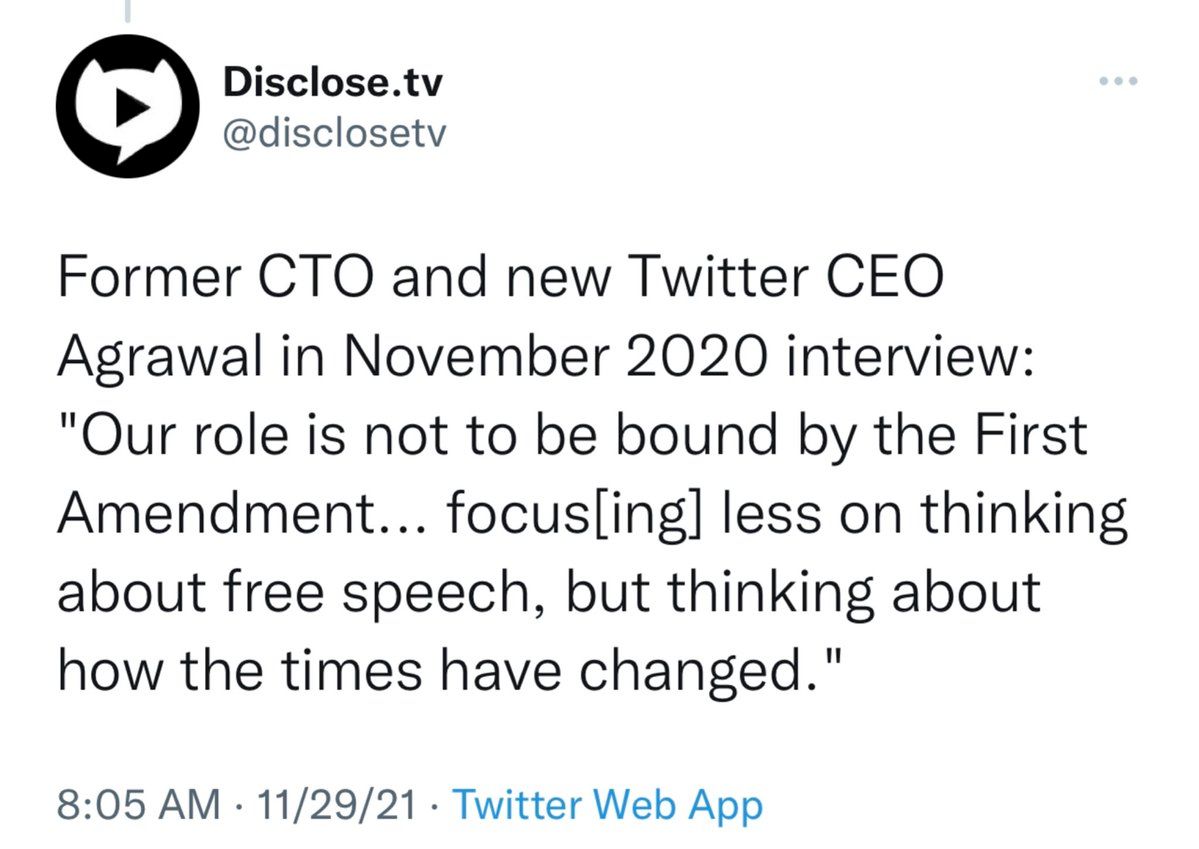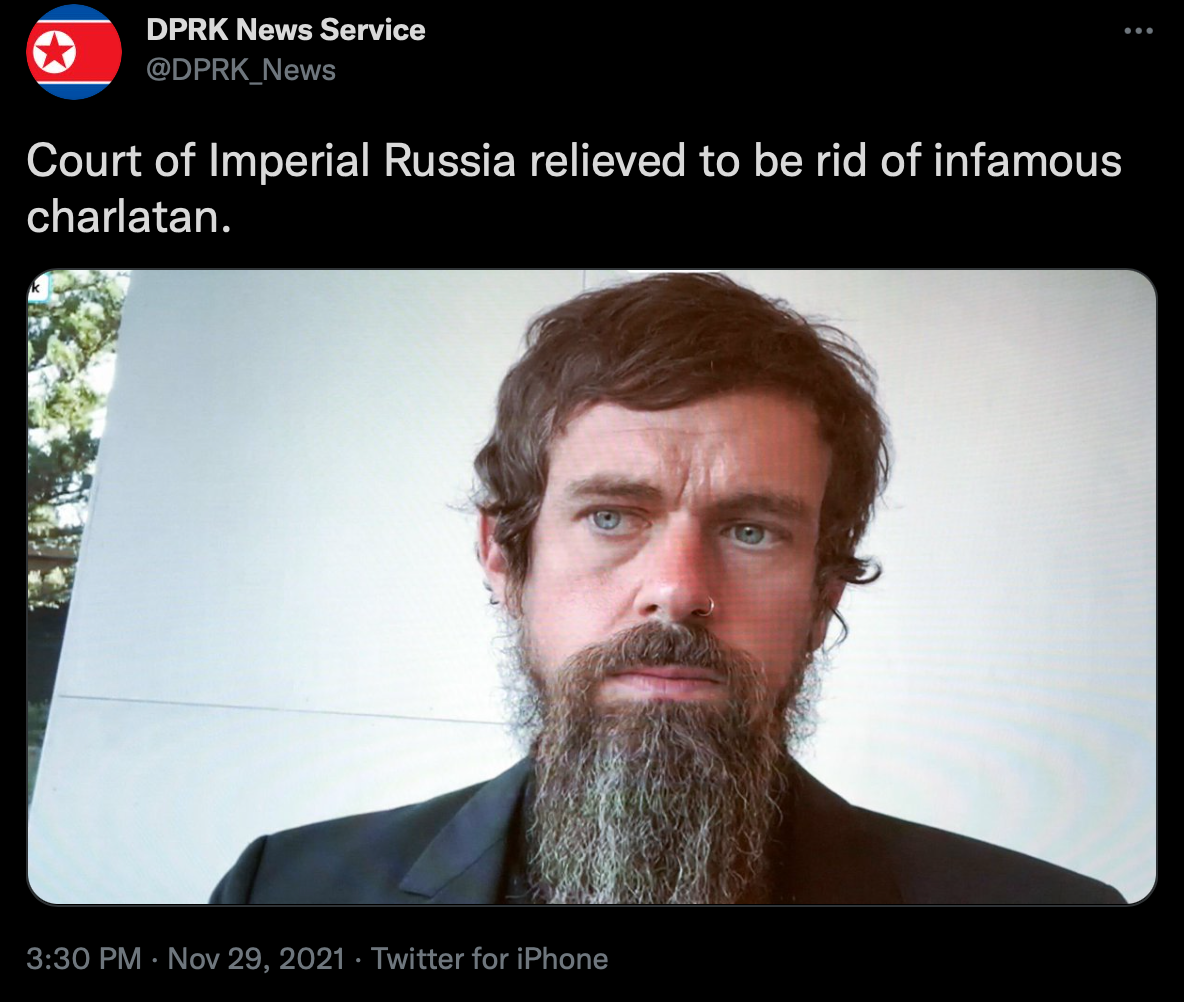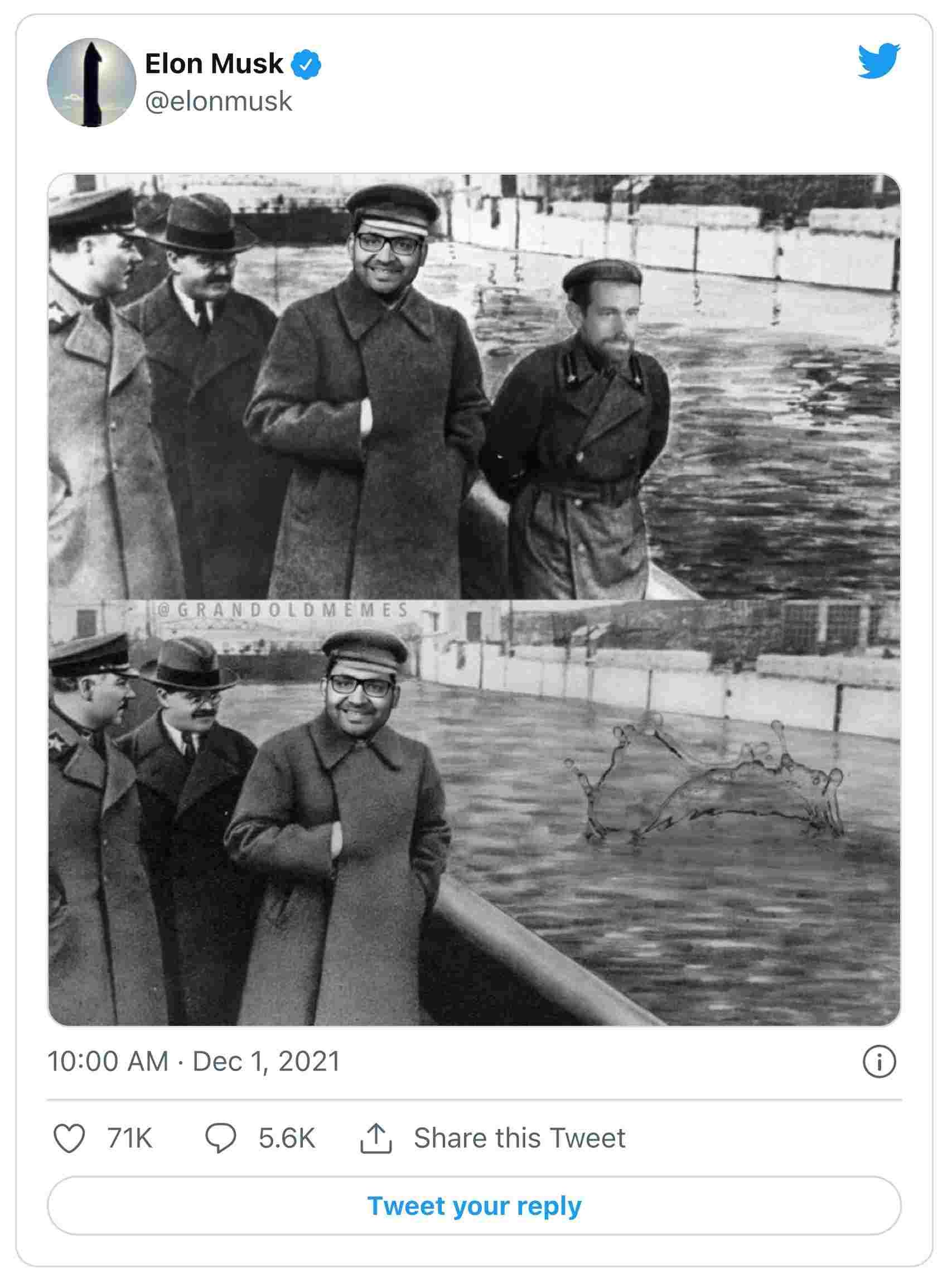The new CEO of Twitter
-
I think what this comes down to is that technology has outpaced our political institutions.
Freedom of speech and press as outline in the constitution have a glaring gap: social media.
We need our best thinkers to come up with ideas on how to deal with this and bake it into our constitution.
An obscure section in some telco law (Section 230), won't do.
The internet is a printing-press level disruption to politics.
-
Don't need to screw with the Constitution. Just consider social media the same as a public town square.
-
Don't need to screw with the Constitution. Just consider social media the same as a public town square.
@jolly said in The new CEO of Twitter:
Don't need to screw with the Constitution. Just consider social media the same as a public town square.
I use reddit quite often. It's a loose federation of "boards" dedicated to specific topics, with a single ID and user interface across it all.
Each board is moderated by its own set of mods (there are overall Reddit mods, but they only get involved with individual boards if they're one of the top ones, or with specific types of violations).
Some boards are moderated heavily. Some aren't. Some only allow woke posts, some only allow conservative posts. It's up to the mods.
Are you saying that this should not be allowed to exist on the internet?
In other words - you'd either have to outlaw forum moderation or maybe make platforms explicitly state their bias (which doesn't have much effect in practice). You can't have both.
My broader point is that the ability to form group and communities based on ideas changes the way citizens interface with the state. Things were different when information was mediated through the press. Now the press just takes its cues from the mob.
-
Taibi: Will Twitter Become an Ocean of Suck?
The original concept of Twitter was egalitarian, flattening, and iconoclastic: “To give everyone the power to create and share ideas, instantly, without barriers.” That mantra fit with then-CEO Dick Costolo’s 2010 claim that “We’re the free speech wing of the free speech party.”
I don't feel like subscribing to read the rest of the article, but it's tempting.
-
@jolly said in The new CEO of Twitter:
Don't need to screw with the Constitution. Just consider social media the same as a public town square.
I use reddit quite often. It's a loose federation of "boards" dedicated to specific topics, with a single ID and user interface across it all.
Each board is moderated by its own set of mods (there are overall Reddit mods, but they only get involved with individual boards if they're one of the top ones, or with specific types of violations).
Some boards are moderated heavily. Some aren't. Some only allow woke posts, some only allow conservative posts. It's up to the mods.
Are you saying that this should not be allowed to exist on the internet?
In other words - you'd either have to outlaw forum moderation or maybe make platforms explicitly state their bias (which doesn't have much effect in practice). You can't have both.
My broader point is that the ability to form group and communities based on ideas changes the way citizens interface with the state. Things were different when information was mediated through the press. Now the press just takes its cues from the mob.
@xenon said in The new CEO of Twitter:
@jolly said in The new CEO of Twitter:
Don't need to screw with the Constitution. Just consider social media the same as a public town square.
I use reddit quite often. It's a loose federation of "boards" dedicated to specific topics, with a single ID and user interface across it all.
Each board is moderated by its own set of mods (there are overall Reddit mods, but they only get involved with individual boards if they're one of the top ones, or with specific types of violations).
Some boards are moderated heavily. Some aren't. Some only allow woke posts, some only allow conservative posts. It's up to the mods.
Are you saying that this should not be allowed to exist on the internet?
In other words - you'd either have to outlaw forum moderation or maybe make platforms explicitly state their bias (which doesn't have much effect in practice). You can't have both.
My broader point is that the ability to form group and communities based on ideas changes the way citizens interface with the state. Things were different when information was mediated through the press. Now the press just takes its cues from the mob.
What can you legally do in a public square?
-
@xenon said in The new CEO of Twitter:
@jolly said in The new CEO of Twitter:
Don't need to screw with the Constitution. Just consider social media the same as a public town square.
I use reddit quite often. It's a loose federation of "boards" dedicated to specific topics, with a single ID and user interface across it all.
Each board is moderated by its own set of mods (there are overall Reddit mods, but they only get involved with individual boards if they're one of the top ones, or with specific types of violations).
Some boards are moderated heavily. Some aren't. Some only allow woke posts, some only allow conservative posts. It's up to the mods.
Are you saying that this should not be allowed to exist on the internet?
In other words - you'd either have to outlaw forum moderation or maybe make platforms explicitly state their bias (which doesn't have much effect in practice). You can't have both.
My broader point is that the ability to form group and communities based on ideas changes the way citizens interface with the state. Things were different when information was mediated through the press. Now the press just takes its cues from the mob.
What can you legally do in a public square?
@jolly said in The new CEO of Twitter:
What can you legally do in a public square?
I'm not talking about moderating illegal content - I'm talking about moderating spaces to only allow a certain type of discourse.
Think of a church - it's a heavily moderated space in terms of the ideas that will be tolerated. You can't just open up the doors and say "this is a public square now". The church will be drowned out by people who don't like religion.
A public square would mean that any public square is open to anyone - and no one could be moderated.
-
@jolly said in The new CEO of Twitter:
What can you legally do in a public square?
I'm not talking about moderating illegal content - I'm talking about moderating spaces to only allow a certain type of discourse.
Think of a church - it's a heavily moderated space in terms of the ideas that will be tolerated. You can't just open up the doors and say "this is a public square now". The church will be drowned out by people who don't like religion.
A public square would mean that any public square is open to anyone - and no one could be moderated.
@xenon said in The new CEO of Twitter:
@jolly said in The new CEO of Twitter:
What can you legally do in a public square?
I'm not talking about moderating illegal content - I'm talking about moderating spaces to only allow a certain type of discourse.
Think of a church - it's a heavily moderated space in terms of the ideas that will be tolerated. You can't just open up the doors and say "this is a public square now". The church will be drowned out by people who don't like religion.
A public square would mean that any public square is open to anyone - and no one could be moderated.
Twitter is a public square. A church is not. It's very simple.
-
@xenon said in The new CEO of Twitter:
@jolly said in The new CEO of Twitter:
What can you legally do in a public square?
I'm not talking about moderating illegal content - I'm talking about moderating spaces to only allow a certain type of discourse.
Think of a church - it's a heavily moderated space in terms of the ideas that will be tolerated. You can't just open up the doors and say "this is a public square now". The church will be drowned out by people who don't like religion.
A public square would mean that any public square is open to anyone - and no one could be moderated.
Twitter is a public square. A church is not. It's very simple.
-
I think if you take social media as public interaction, I don't see how it can be taken any other way.
@jolly said in The new CEO of Twitter:
I think if you take social media as public interaction, I don't see how it can be taken any other way.
There are many online communities for specific religions, political ideologies, etc.
I used the reddit as an example because it has 2X the traffic of twitter. There many, many, many heavily curated and moderated communities on reddit. (I got banned from multiple Trump subreddits in 2016/2017 for obvious reasons. I've been banned from some leftist ones as well.)
Is that a public square?
-
@xenon said in The new CEO of Twitter:
@jolly said in The new CEO of Twitter:
What can you legally do in a public square?
I'm not talking about moderating illegal content - I'm talking about moderating spaces to only allow a certain type of discourse.
Think of a church - it's a heavily moderated space in terms of the ideas that will be tolerated. You can't just open up the doors and say "this is a public square now". The church will be drowned out by people who don't like religion.
A public square would mean that any public square is open to anyone - and no one could be moderated.
Twitter is a public square. A church is not. It's very simple.
@jolly said in The new CEO of Twitter:
Twitter is a public square.
Actually, I don't think that analogy works. Twitter is like a shop that is situated on the side of a public square. The internet is a public square, Twitter is a private company. If a shop is really, really successful, it doesn't suddenly have to allow people to say and do what the hell they like in there.
-
That would be the case if Twitter was a small shop that held a dozen people.
If my name was Stalin, I would love the way Twitter is currently set up. Facebook, too. He who controls the information, controls the public.
@jolly said in The new CEO of Twitter:
That would be the case if Twitter was a small shop that held a dozen people.
If my name was Stalin, I would love the way Twitter is currently set up. Facebook, too. He who controls the information, controls the public.
But you're the one arguing that the government should send them a notice saying:
"You've become too powerful, we set your rules now."
Well intentioned rules to begin with, for sure.
Also - let's look at the actual issue with censorship. Let's take the Hunter Biden stories. The real problem was not twitter blocking links to articles. I read many many articles about the censorship. The real issue was left-leaning sources not reporting on it.
Regulating social media doesn't fix that.
-
@jolly said in The new CEO of Twitter:
That would be the case if Twitter was a small shop that held a dozen people.
If my name was Stalin, I would love the way Twitter is currently set up. Facebook, too. He who controls the information, controls the public.
But you're the one arguing that the government should send them a notice saying:
"You've become too powerful, we set your rules now."
Well intentioned rules to begin with, for sure.
Also - let's look at the actual issue with censorship. Let's take the Hunter Biden stories. The real problem was not twitter blocking links to articles. I read many many articles about the censorship. The real issue was left-leaning sources not reporting on it.
Regulating social media doesn't fix that.
@xenon said in The new CEO of Twitter:
@jolly said in The new CEO of Twitter:
That would be the case if Twitter was a small shop that held a dozen people.
If my name was Stalin, I would love the way Twitter is currently set up. Facebook, too. He who controls the information, controls the public.
But you're the one arguing that the government should send them a notice saying:
"You've become too powerful, we set your rules now."
Well intentioned rules to begin with, for sure.
Also - let's look at the actual issue with censorship. Let's take the Hunter Biden stories. The real problem was not twitter blocking links to articles. I read many many articles about the censorship. The real issue was left-leaning sources not reporting on it.
Regulating social media doesn't fix that.
Right. What you're really talking about is implied consensus through coercion. But the problem is that social media is the explicit tool used to enact that coercion. It's manufacturing consent.
What's hilarious to me is that this is one of those bizarre scenarios in which conservatives would whole-heartedly agree with an idea formulated by Noam Chomsky.
-
@xenon said in The new CEO of Twitter:
@jolly said in The new CEO of Twitter:
That would be the case if Twitter was a small shop that held a dozen people.
If my name was Stalin, I would love the way Twitter is currently set up. Facebook, too. He who controls the information, controls the public.
But you're the one arguing that the government should send them a notice saying:
"You've become too powerful, we set your rules now."
Well intentioned rules to begin with, for sure.
Also - let's look at the actual issue with censorship. Let's take the Hunter Biden stories. The real problem was not twitter blocking links to articles. I read many many articles about the censorship. The real issue was left-leaning sources not reporting on it.
Regulating social media doesn't fix that.
Right. What you're really talking about is implied consensus through coercion. But the problem is that social media is the explicit tool used to enact that coercion. It's manufacturing consent.
What's hilarious to me is that this is one of those bizarre scenarios in which conservatives would whole-heartedly agree with an idea formulated by Noam Chomsky.
@aqua-letifer said in The new CEO of Twitter:
@xenon said in The new CEO of Twitter:
@jolly said in The new CEO of Twitter:
That would be the case if Twitter was a small shop that held a dozen people.
If my name was Stalin, I would love the way Twitter is currently set up. Facebook, too. He who controls the information, controls the public.
But you're the one arguing that the government should send them a notice saying:
"You've become too powerful, we set your rules now."
Well intentioned rules to begin with, for sure.
Also - let's look at the actual issue with censorship. Let's take the Hunter Biden stories. The real problem was not twitter blocking links to articles. I read many many articles about the censorship. The real issue was left-leaning sources not reporting on it.
Regulating social media doesn't fix that.
Right. What you're really talking about is implied consensus through coercion. But the problem is that social media is the explicit tool used to enact that coercion. It's manufacturing consent.
What's hilarious to me is that this is one of those bizarre scenarios in which conservatives would whole-heartedly agree with an idea formulated by Noam Chomsky.
Agreed. But I think we'd have to get very heavy-handed with government intervention if we were to try and legislate that coercion out of existence.
Social media allows groups of ideologues to coerce others. Twitter is just the tool of the day.
I think we need to learn how to deal with the impulse to coerce.
This is what happens when you decentralize media power.


